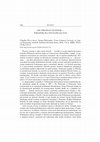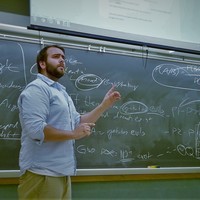Book Reviews by Piotr Biłgorajski

Roczniki Filozoficzne, 2019
Wszyscy nosimy w sobie ziarno filozofii -twierdzi w swojej najnowszej książce Timothy Williamson,... more Wszyscy nosimy w sobie ziarno filozofii -twierdzi w swojej najnowszej książce Timothy Williamson, profesor logiki na Uniwersytecie Oksfordzkim, i dodaje, że największym wyzwaniem jest stworzenie warunków, aby te nasiona zakiełkowały. Williamson zawodowo zajmuje się filozofią już od ponad czterdziestu lat, co -jak przyznaje -jest dlań największym źródłem radości, ale też frustracji. Spośród bowiem wszystkich dyscyplin akademickich filozofia wydaje się mieć największe problemy ze swoją tożsamością. Powracające spory o przedmiot, metody i cel filozofii sprawiają, że w powszechnej świadomości filozofia sprawia wrażenie działalności polegającej na udzielaniu mętnych odpowiedzi na mętne pytania. Tradycyjny pogląd, że filozofia to poszukiwanie prawdy, na niewiele się zdaje młodym adeptom filozofii, którzy zaczynając swoją przygodę z akademią, muszą nauczyć się uprawiać filozofię w sposób profesjonalny. Ich przede wszystkim interesuje, jak robić to dobrze. Doing Philosophy: From Common Curiosity to Logical Reasoning w skondensowanej formie (zaledwie 176 stron) wprowadza w autorski wykład metodologii filozofii.

Książka Thought Experiments in Philosophy, Science and the Arts pod redakcją Melanie Frappier, Le... more Książka Thought Experiments in Philosophy, Science and the Arts pod redakcją Melanie Frappier, Letitii Meynell i Jamesa R. Browna to jedenasty tom serii "Philosophy of Science" wydawnictwa Routledge. Czternaście artykułów składających się na całość jest rezultatem przeprowadzonych w 2010 roku na uniwersytecie Dalhousie w Kanadzie warsztatów pt. "Science without Data: The Role of Thought Experiments in Empirical Investigations". Tytuł warsztatów trafnie oddaje istotę eksperymentów myślowych i zarazem odnosi się do głównego przedmiotu kontrowersji z nimi związanych. W tradycyjnym ujęciu eksperymenty myślowe wykonywane są -jak głosi tytuł klasycznej książki jednego z redaktorów -w "laboratorium umysłu" (J.R. Brown, The Laboratory of Mind: Thought Experiments in the Natural Sciences, London: Routledge, 1991) i mają polegać na uzyskiwaniu nowej wiedzy o świecie w oparciu o fikcyjny scenariusz oraz na drodze czysto spekulatywnej. Wydaje się jednak, że obecność tego typu apriorycznych narzędzi badawczych w ramach nauk przyrodniczych, które preferują raczej metody oparte na empirycznym eksperymencie i obserwacji, jest zaskakująca i wymaga wyjaśnienia. Z drugiej strony, chociaż nie powinno dziwić, że eksperymenty myślowe są niezwykle popularne także w filozofii, to właśnie sami filozofowie wytaczają najwięcej zarzutów przeciwko uprawianiu nauki przy ich pomocy. Ale to także filozofia wydaje się najlepszym miejscem, aby podjąć próbę wypracowania jakiegoś rozwiązania.
Papers by Piotr Biłgorajski
Roczniki Filozoficzne
Ultimism is the view that there is a metaphysically and axiologically ultimate reality in relatio... more Ultimism is the view that there is a metaphysically and axiologically ultimate reality in relation to which it is possible to achieve the ultimate good. John Schellenberg believes that ultimism is the backbone of every religion, while the differences between religions arise from different views of what the nature of the ultimate is. Schellenberg tries to show that if there is progress in religion, then it is most reasonable to assume that we are only at the beginning of the inquiry into the ultimate. The aim of the paper is to show that epistemological and methodological objections can be raised against ultimism. It will present an epistemological argument, pointing to the cognitive limitations of imagination, and a methodological argument, questioning the feasibility of Schellenberg’s project.
The article draws on the work of Stephen Yablo and Peter van Inwagen so as to analyze the problem... more The article draws on the work of Stephen Yablo and Peter van Inwagen so as to analyze the problems of (1) imaginability as the criterion of conceivability and (2) the relation between conceiv-ability and possibility. Given that thought experiments are a kind of modal reasoning, the findings about the nature of the conceivability-possibility relation affect the role of thought experiments in philosophy. In my view, although imaginability fails to provide new knowledge about the world, it is a useful tool for justifying philosophical intuitions.
This article is a polemic with Ireneusz Ziemiński’s essay entitled Crisis of Christianity from Ph... more This article is a polemic with Ireneusz Ziemiński’s essay entitled Crisis of Christianity from Philosophy of Religion’s Perspective. According to Ziemiński, the crisis concerning the essence of Christianity, would be the cause of its disappearance. While I agree with Ziemiński that some elements of Christianity may be in crisis, I argue against the thesis that the crisis affects the whole of Christianity. I point out the difficulty in identifying what the essence of Christianity is and argue that Ziemiński’s diagnosis does not concern the essence of Christianity but individual denominations instead. Therefore, the central theorem of Ziemiński’s article is not justified well enough.









Uploads
Book Reviews by Piotr Biłgorajski
Papers by Piotr Biłgorajski